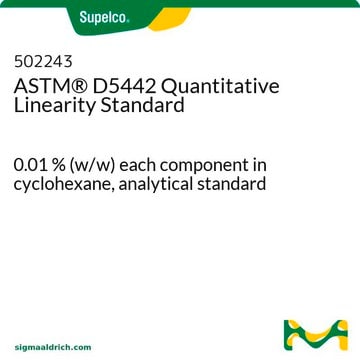8.20633
n-Hexadecane
for synthesis
Synonyme(s) :
n-Hexadecane, Cetane
About This Item
Produits recommandés
Pression de vapeur
<0.1 hPa ( 20 °C)
Niveau de qualité
Pureté
≥99.0% (GC)
Forme
liquid
kinematic viscosity
<7 cSt(40 °C)
Pf
18 °C
Température de transition
flash point 135 °C
Densité
0.77 g/cm3 at 20 °C
Température de stockage
2-30°C
InChI
1S/C16H34/c1-3-5-7-9-11-13-15-16-14-12-10-8-6-4-2/h3-16H2,1-2H3
Clé InChI
DCAYPVUWAIABOU-UHFFFAOYSA-N
Application
- Determination of solvation parameter model compound descriptors by gas chromatography.: This research explores the use of gas chromatography to determine solvation parameters of various compounds, including n-Hexadecane. The study highlights n-Hexadecane′s role in solvation parameter models, which are crucial for understanding solvent-solute interactions in various chemical processes (Poole, 2024).
- Shear-Responsive Sol-Gel Transition of Phase Change Material Emulsions for an Injectable Thermal Insulation Platform.: This study investigates the phase change properties of n-Hexadecane within emulsions used for thermal insulation. The findings reveal the potential of n-Hexadecane as a key material in advanced thermal management systems, especially for injectable thermal insulation applications (Sun et al., 2023).
- Microfluidic Fabrication and Thermal Properties of Microencapsulated N-Hexadecane with a Hybrid Polymer Shell for Thermal Energy Storage.: This paper discusses the fabrication of microencapsulated n-Hexadecane using microfluidic techniques. The encapsulation enhances the thermal stability and efficiency of n-Hexadecane as a phase change material, making it suitable for thermal energy storage applications (Yang et al., 2022).
- Microencapsulated phase change material via Pickering emulsion stabilized by cellulose nanofibrils for thermal energy storage.: The study explores the stabilization of n-Hexadecane within Pickering emulsions using cellulose nanofibrils. The microencapsulation significantly improves the thermal energy storage capabilities of n-Hexadecane, making it an effective component in sustainable energy systems (Bahsi Kaya et al., 2022).
Remarque sur l'analyse
Density (d 20 °C/ 4 °C): 0.773 - 0.774
Identity (GC): passes test
Due to its specific melting range the product may be solid, liquid, a solidified melt or a supercooled melt.
Mention d'avertissement
Danger
Mentions de danger
Conseils de prudence
Classification des risques
Asp. Tox. 1
Risques supp
Code de la classe de stockage
10 - Combustible liquids
Classe de danger pour l'eau (WGK)
WGK 1
Point d'éclair (°F)
233.6 °F
Point d'éclair (°C)
112 °C
Certificats d'analyse (COA)
Recherchez un Certificats d'analyse (COA) en saisissant le numéro de lot du produit. Les numéros de lot figurent sur l'étiquette du produit après les mots "Lot" ou "Batch".
Déjà en possession de ce produit ?
Retrouvez la documentation relative aux produits que vous avez récemment achetés dans la Bibliothèque de documents.
Les clients ont également consulté
Notre équipe de scientifiques dispose d'une expérience dans tous les secteurs de la recherche, notamment en sciences de la vie, science des matériaux, synthèse chimique, chromatographie, analyse et dans de nombreux autres domaines..
Contacter notre Service technique









